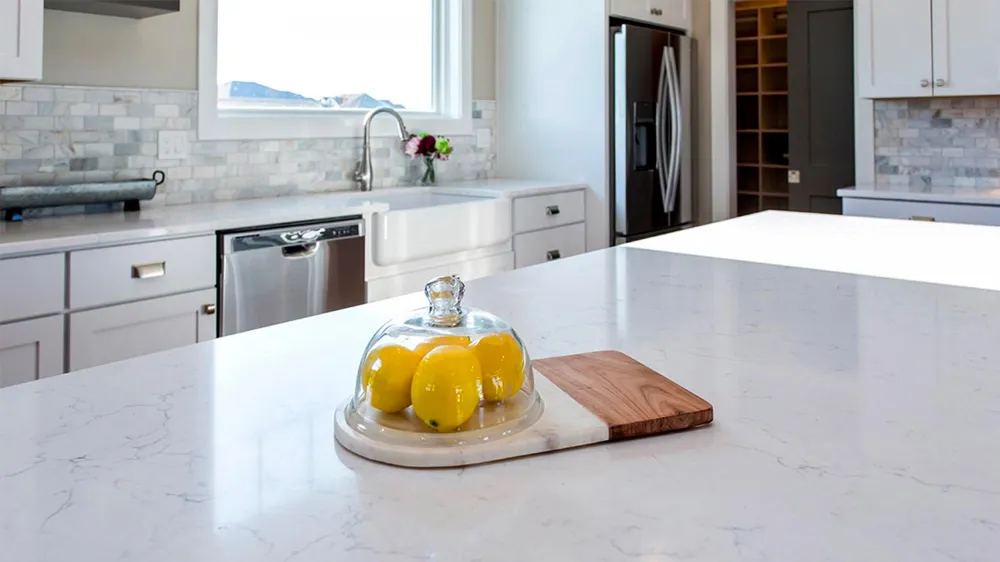Quartz countertops have become a popular choice for homeowners seeking durability and modern elegance. Known for their sleek appearance and low-maintenance qualities, quartz surfaces often stand out as a practical and stylish option. However, questions about their upkeep—especially whether they require sealing—frequently arise.
Unlike natural stone options like granite or marble, quartz is engineered, which gives it unique properties. This leaves many wondering if traditional sealing methods are necessary or even beneficial. Understanding the specific care needs of quartz countertops can help preserve their beauty and functionality for years to come. For more info you can reach out granite selection.
The Non-Porous Nature of Quartz Countertops Explained
Quartz countertops are engineered from a combination of natural quartz crystals and a small percentage of resins. This manufacturing process creates a surface that is non-porous, meaning it doesn’t absorb liquids, bacteria, or stains. Unlike materials like granite, which have microscopic pores, quartz is inherently sealed during production.
The non-porous nature eliminates the need for external sealing, as seen in porous stones like granite and marble. For instance, granite typically requires periodic sealing to maintain its resistance to stains and damage, but quartz provides consistent protection without additional treatments.
This feature makes quartz highly resistant to common household substances like coffee, wine, and oil. Maintenance involves only simple cleaning with mild soap and water. Homeowners often choose quartz for its low-maintenance advantage over other materials that rely on regular upkeep.
Why Quartz Countertops Don’t Require Sealing
Quartz countertops don’t need sealing because of their engineered, non-porous structure. Manufacturers combine natural quartz crystals with resins, creating a surface that resists absorption of liquids and bacteria. This composition ensures that quartz remains stain-resistant without additional treatments.
Unlike porous stones like granite, which often require sealing to prevent staining, quartz’s surface is inherently protected. Substances like wine, oil, and coffee don’t penetrate quartz, making it easier to clean and maintain over time.
Omitting the need for sealing not only reduces maintenance but also eliminates long-term costs associated with resealing treatments. Quartz countertops retain their aesthetic and functional advantages with basic cleaning, reinforcing their popularity among modern homeowners.
Daily Care Tips to Keep Quartz Countertops Looking New
- Clean Quartz Surfaces Regularly
Use a soft cloth or sponge with mild dish soap and warm water to clean quartz countertops. Remove spills immediately to prevent sticky residues from forming. Avoid abrasive pads that can scratch the surface. - Avoid Harsh Cleaners
Stick to non-acidic, non-alkaline cleaners when maintaining quartz. Products containing bleach, ammonia, or vinegar can damage the surface’s resin finish over time. - Protect from Excess Heat
Place hot pads or trivets under pots, pans, and heated appliances. Direct contact with high temperatures can cause thermal damage, even on durable surfaces like quartz. - Minimize Impact Damage
Handle heavy items with care near countertop edges. Quartz’s strength reduces the risk of chips or cracks, but excessive force at vulnerable points may still result in damage. - Use Cutting Boards
Cutting directly on quartz countertops may mar the finish, even though the surface resists scratches. Use a cutting board to protect both the countertop and your knives.
By following these tips, homeowners can maintain the polished look of quartz countertops without requiring sealing treatments typical of porous surfaces like granite.
How Quartz Maintenance Differs from Granite and Marble
Quartz countertops require less maintenance compared to granite and marble due to their engineered, non-porous surface. While quartz does not absorb liquids or bacteria, granite and marble are porous stones that require sealing to prevent staining and moisture absorption. Homeowners need to apply a sealant to granite and marble surfaces periodically, typically every 1–2 years, to maintain their protective layer.
Cleaning methods also differ. Quartz surfaces can be cleaned with mild soap and water, while granite and marble require specialized pH-neutral cleaners to avoid damage to their sealant. Additionally, acidic substances like vinegar or lemon juice can etch marble’s surface, unlike quartz that resists such damage.
Durability varies as well. Quartz resists scratches, stains, and impact better than granite and marble due to its engineered properties. Marble, in particular, is softer and more prone to scratches and etching. Homeowners often need to take extra precautions to protect marble and granite surfaces, while quartz countertops demand fewer protective measures.
These differences highlight why homeowners often compare their long-term care requirements when evaluating quartz or natural stone options. Exploring “does quartz need to be sealed“ helps illustrate the advantage of selecting a durable, low-maintenance countertop material over porous alternatives like granite.
Common Mistakes to Avoid When Caring for Quartz Countertops
While quartz countertops are low-maintenance, avoiding common mistakes can help preserve their appearance and longevity. Harsh chemical cleaners, abrasive scrubbers, and excessive heat can damage the surface over time. It’s essential to use gentle cleaning methods and avoid placing hot pots or pans directly on the countertop.
Failing to use cutting boards or trivets can also lead to unnecessary wear and tear. Although quartz is durable, treating it with care ensures it stays in top condition for years. By understanding its unique properties and following proper care practices, homeowners can fully enjoy the benefits of this modern, low-maintenance material.

